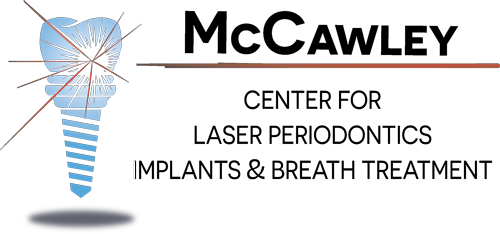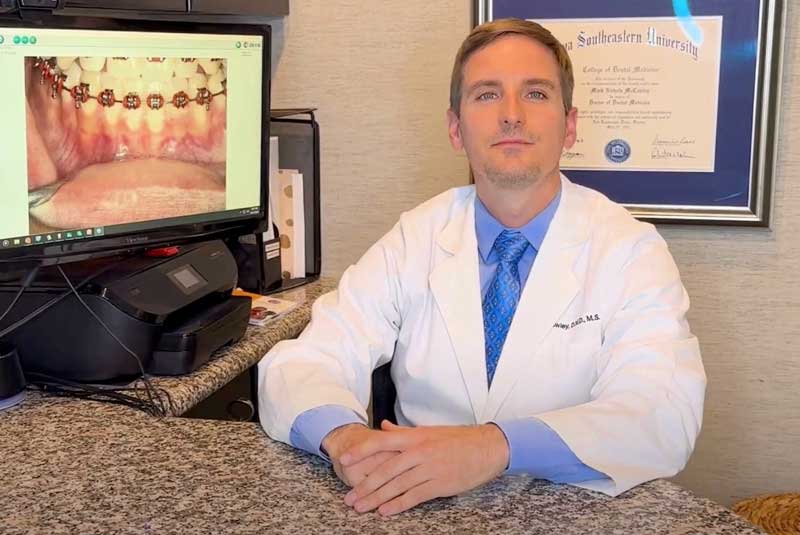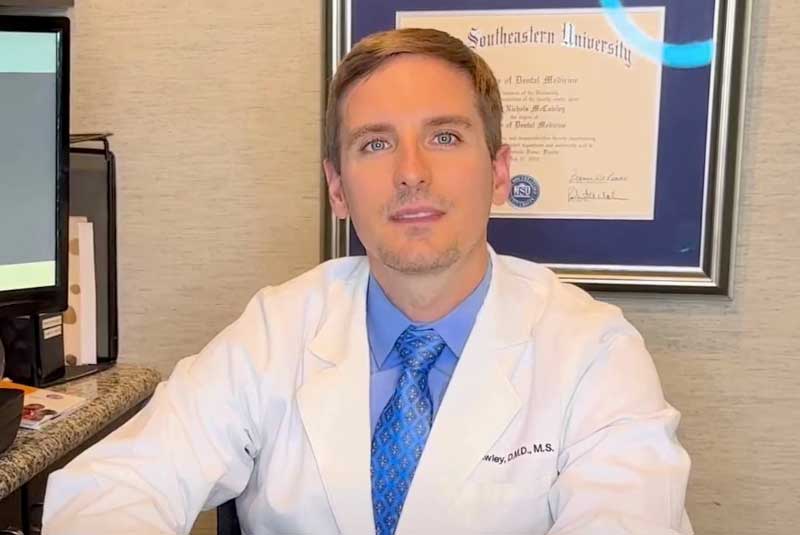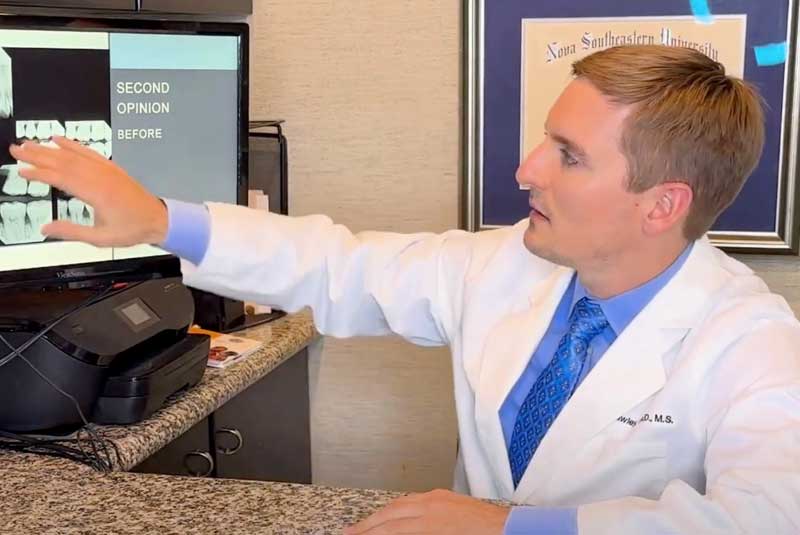| ✅ Reviewed by Dr. Tom McCawley | 🕒 Reading time: three minutes |
We all love our dogs, but no one loves “dog breath.” If your pup’s kisses are clearing the room, it’s time to pay attention. Chronic bad breath in dogs isn’t normal, it’s often a sign of something more serious.
At McCawley Center for Laser Periodontics & Implants in Fort Lauderdale, we care deeply about oral health, including the four-legged members of your family.
Dr. Tom McCawley joined local orthopedic and sports physical therapist Dr. Christiana Maron to discuss how dog bad breath can signal serious health issues and how it can affect you too.
Watch the interview here:
| 😷Gum Disease Is Contagious, Even Between You and Your Dog That “harmless” dog kiss might be sharing more than affection. Gum disease bacteria can transfer between pets and people through saliva and close contact. |
Is Bad Breath in Dogs a Sign of Illness?
Dogs get gum disease more often than humans, and it can lead to serious problems like infections, abscesses, and even organ damage. According to veterinary research, bacteria from periodontal disease may harm a dog’s heart, liver, and kidneys and in severe cases, even lead to death.
What’s more, the bacteria that cause gum disease are transmissible between pets and humans. So while your dog may be your best friend, kissing them could be increasing your own risk of oral infection.
“We’ve seen patients who couldn’t get rid of their own infection because they were kissing their dog—and the bacteria matched exactly.” —Dr. Tom McCawley
How to Get Rid of Bad Dog Breath Fast
Here are four practical remedies to help fix your dog’s bad breath fast, starting with what works and what to skip.
🪥 1. Brush Your Dog’s Teeth
Brushing just twice a week can prevent most dental issues. Use a soft-bristled toothbrush and pet-safe cleaner like diluted peroxide or chlorhexidine (products like DentaHex are recommended). Dr. Maron demonstrates this technique in the video using her own dog showing just how simple it can be to do at home
❌ 2. Skip the Gimmicks
Most commercial dog dental products are ineffective. Avoid water additives and treats with ingredients like green tea or glycerin, they do not kill bacteria.
🩺 3. Watch for Red Flags
Bleeding gums, bad breath, or yellow buildup are all signs of gum disease. These mean your dog may be in pain and at risk for serious health problems.
🐾 4. Avoid Dog Kisses
It may sound extreme, but if your dog has gum disease, kissing can transmit bacteria to you or reinfect your dog if you are undergoing treatment yourself.
What Actually Works
Dr. McCawley recommends this simple routine:
- Brush your dog’s teeth 2x per week with a soft brush.
- Apply chlorhexidine rinse after brushing to reduce bacterial regrowth.
- Scrape your dog’s tongue to remove odor-causing bacteria.
- Use peroxide (diluted) if chlorhexidine isn’t available.
- Focus on the back molars and along the gumline.
This approach prevents tartar, protects organs, and keeps your pup’s breath fresh.
“Just like with people, brushing your dog’s tongue helps get rid of bad breath, it’s where a lot of bacteria live.” —Dr. McCawley
Prevention = Better Health and Lower Costs
Brushing your dog’s teeth not only keeps them healthier and more comfortable, it saves you money. Regular care prevents the need for costly cleanings under general anesthesia, which carry their own risks.
Starting early is best, but it’s never too late. Be gentle, keep it positive, and make brushing part of your pet’s routine.
A Healthier Mouth for You—and Your Dog
If your dog has bad breath, take it seriously. It could be a sign of gum disease and it could affect both your pet’s life and your own oral health.
Want to protect your smile, too? At McCawley Center for Laser Periodontics & Implants in Fort Lauderdale, we use microscopic diagnostics and advanced treatment to eliminate harmful bacteria and prevent reinfection.
To book an appointment at our periodontal office in Fort Lauderdale, FL, call (954) 807-4829 or visit us at 800 East Broward Blvd #706 Fort Lauderdale, FL.











